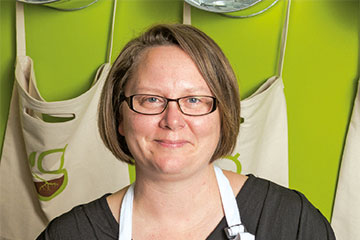Waste not, want not

After watching a movie about the amount of plastic waste in the world's oceans, a concerned Crystal Lehky woke up with a start in the middle of the night. “It totally freaked me out,”says Lehky. Rather than push it out of her mind, Lehky decided to do something about the problem. “What if there was a store with no plastic?” she thought. That was the beginning of Green, a 1,200-sq.-ft. zero waste grocery store that opened in June on Salt Spring Island, B.C. Based on a concept in Europe that has proven zero waste grocery is not “a flash in the pan,” the store is operating as a test market for Lehky, who plans to expand into Vancouver next year.
Green sells a wide range of non-packaged bulk products, such as nuts and spices, that customers can take home in their own containers. Suppliers commit to providing their goods to the store in reusable packaging, ensuring nothing goes to waste.
Green is among several zero waste grocery stores that have opened across Canada this year.
“I think Canadians are ready for zero waste,” says Lehky, who used to work as a manager of a large grocery chain. “The waste caused by your traditional grocery store is unacceptable, and if the Canadian public knew what was going on, it would have already stopped.”
Canadians waste an estimated $27-billion worth of food and packaging every year— something that Marie-Soleil L’Allier aims to change “one basket at a time.” She’s one of four environmental studies students who opened Épicerie Loco in Montreal’s Villeray neighbourhood in August. “We were looking for ways to make an impact beyond our personal lives,” says L’Allier.
Épicerie Loco sells “a bit of everything” from dried bulk foods and shampoo to dairy and prepared foods from a caterer who makes use of the store’s unsold produce. Containers are available to customers in exchange for deposits ranging from $1 to $2.
The response has been very good, with customers from as far away as Ontario and the Laurentians shopping in the 1,000-sq.-ft. store, she says.
Zero waste grocery shopping is “something that people have been wanting to do for a long time,” says Brianne Miller, owner and founder of Zero Waste Market, which has been operating pop-up shops in Vancouver since last year. “People are becoming more aware of where their food comes from.” Miller, a marine biologist, plans to open a permanent 2,000 sq.-ft.-store in the Kitsilano area of Vancouver as soon as a site can be found.
The pop-ups have been attracting a wider demographic than Miller expected. While she originally thought the main audience would be young, active professionals and young families, shoppers have ranged from teenagers to grandparents. L’Allier has also been surprised by the demographics at Épicerie Loco. Its target market is women aged 25 to 35, but it’s attracting baby boomers, young families and seniors who see the store’s bulk buying concept as “a return to common sense.”
Aside from eliminating packaging, zero waste grocery stores help discourage food waste by encouraging customers to buy only the quantities they need, says Ahlem Belkheir, co-owner of Méga Vrac, an 1,800-sq.-ft. zero waste grocery store that opened in late summer in Montreal. As part of its aim to eliminate packaging at its source, Méga Vrac’s owners bring barrels and other containers to local suppliers and fill them on-site.
L’Allier says proponents of zero waste grocery shopping hope major players will join in.
However, major chains like Bulk Barn say while they agree with the goal of reducing waste, obstacles must be overcome before allowing the use of reusable containers in its stores. According to Bulk Barn, there is a risk foods could become contaminated if customers dip their own containers into its products or pour excess amounts of product back into bins from unsterilized containers.
To ensure the cleanliness and sanitation of reusable containers, Bulk Barn has started a reusable container program test market in its Liberty Village store in Toronto. “A lot of those bigger companies are very risk averse,” says Miller. “I hope these small stores are able to show it works at a small scale and there’s a demand.”

